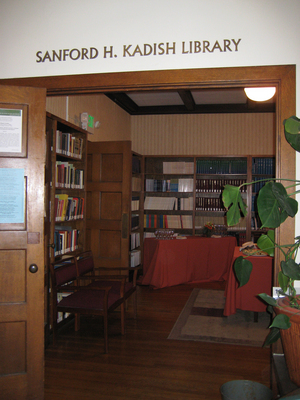
By Andrew Cohen
Former Berkeley Law Dean Sanford Kadish, instrumental in creating the Berkeley Law Jurisprudence and Social Policy (JSP) Program, was honored at a ceremony last month dedicating the JSP library in his name.
The newly-named Sanford H. Kadish Library houses books and journals that focus on the intersection of law, social sciences, and humanities—including many authored by faculty members affiliated with JSP and the Center for the Study of Law & Society (CSLS).
“This library dedication is a ‘thank you’ of sorts from people in the JSP program and CSLS, which is massively gratifying,” Kadish said. “I’ve invested a good deal of my life at the law school, and it’s heartwarming to be recognized this way.”
Kadish, who joined the law school faculty in 1964 and served as its dean from 1975-1982, played a pivotal role in building the center’s national prominence.
When UC Berkeley’s School of Criminology dissolved in 1975, Chancellor Albert Bowker appointed a committee to figure out how to employ the school’s research scholars and criminologists. Kadish and fellow law professor Philip Selznick, the founding director of CSLS, were named to the committee.
Under Selznick’s chairmanship, they drafted plans for an interdisciplinary Ph.D. program in social science, humanities, and the law, as well as an undergraduate program in legal studies.
Kadish and Selznick worked together to win approval of the program by the Academic Senate, Graduate Division, and UC and campus administrators. The program’s campus affiliation “became a controversial issue,” recalled Kadish, who acknowledged that his authority and influence as Berkeley Law’s dean “played a significant role in securing its placement at the law school.”
Blazing a new trail
“Sandy Kadish and Philip Selznick took a radical gamble in creating such an unusual program,” said Lauren Edelman ’86, associate dean of the JSP Program. “But it has paid off immeasurably by producing outstanding graduates, many of whom are now leaders in their field. It has also helped to shape the study of law as one that must draw upon disciplinary expertise in the social sciences and the humanities as well as an in-depth understanding of legal doctrine.”
Kadish thought the program “would provide a tremendous shot of academic red blood corpuscles into our institution. The essential premise of this new endeavor was that it would place an emphasis on viewing the law from the outside rather than just from the inside.”
To that end, the program was geared to study legal ideas and institutions from the standpoint of one or more disciplines, such as economics, sociology, philosophy, and history. Founded in 1978, it remained the first and only law school Ph.D. program until the last decade.
In recent years, the program has significantly expanded its capacity to train students in cutting-edge empirical methodologies ranging from quantitative analysis to systematic qualitative fieldwork.
An enduring legacy
Kadish’s lasting impact on JSP and CSLS was touted during the dedication ceremony. “The contribution of Sandy’s important scholarship on criminal law and his lively intelligence and collegiality to the development of our renown as the world’s premier law and society research center is immeasurable,” said CSLS Executive Director Rosann Greenspan.
This year, the center has welcomed more than 30 scholars from 15 countries. Its weekly speaker series draws faculty and graduate students from across campus to presentations by leading scholars in fields such as law, history, anthropology, sociology, and rhetoric.
CSLS scholars work closely with JSP students, recognized for their outstanding scholarship. The students have won the Law and Society Association national prize for best graduate student paper in five of the past seven years. They regularly secure top research awards from professional academic associations and research grants from the National Science Foundation as well as other federal and private foundations.
A parallel Kadish legacy endures through the law school’s Kadish Center for Morality, Law, and Public Affairs, which Sanford endowed with his late wife, June Kadish, in January 2000. The center seeks to promote research and reflection on moral philosophical issues in law and public life, with special concern for the substantive aspects of criminal law.